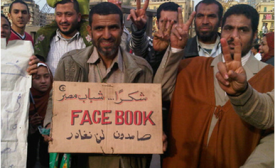media
Somali security forces have raided and closed Radio Shabelle, a popular independent broadcasting station located in Mogadishu. Law enforcement officers entered the building on Saturday. Station owner and director Abdimalik Yusuf Mohamud says some of the 37 staff members were beaten by police before they were arrested and detained. Police also confiscated computers and other equipment.
A new book by Naomi Sakr, Transformations in Egyptian Journalism (I.B. Tauris, 2013), should be required reading for American public diplomacy specialists who want to engage Egyptians through the media. Bilingual Sakr, a media policy professor at the University of Westminster and director of its CAMRI Arab Media Centre, draws on new research and decades’ experience tracking Arab media trends to offer a readout on how Egyptian journalists and their employers have been struggling and coping yet also innovating since the 2011 revolution.

A new book by Naomi Sakr, Transformations in Egyptian Journalism (I.B. Tauris, 2013), should be required reading for American public diplomacy specialists who want to engage Egyptians through the media.
China's media regulator has vowed to protect "lawful reporting rights," state media said, in a rare official intervention over press freedom after a journalist was detained by police. Chen Yongzhou, with the New Express tabloid, was held last Friday on "suspicion of damaging business reputation" after he wrote a series of articles on "financial problems" at Zoomlion, a partly state-owned construction machinery manufacturer.
China doesn’t just exert heavy control over state media; its influence over media outlets outside China is expanding, according to a new report by Freedom House. For the past three years, the government has been investing millions of dollars in a global soft-power push. State newspaper China Daily publishes inserts of its English edition in major Western papers from the Washington Post to the New York Times. China’s Central Television, or CCTV, has hired dozens of experienced reporters from the US for its Washington bureau and rivals other foreign operations like Al-Jazeera America.
Everywhere he looks nowadays, Nicolás Maduro sees conspiracies. At least a dozen plots to assassinate him have allegedly been detected since he became Venezuela’s president in April. Mr Maduro recently expelled three American diplomats for supposedly conspiring with the opposition, business groups and unions to wage “economic war” and overthrow the government. Some plots may even be real: there are rumours of discontent in the armed forces, on which the president is lavishing time and money. But publicly, at least, the opposition media are Mr Maduro’s prime suspects.
This is the last time you will be reading The International Herald Tribune; as of tomorrow, it is The International New York Times.
Pakistani schoolgirl Malala Yousafzai has become a formidable force for rights in the year since the Taliban shot her, but an equally formidable public relations operation has helped her spread her message. The 16-year-old campaigner for girls' education has been nominated for the Nobel Peace Prize, addressed the UN, published an autobiography and been invited to tea with Queen Elizabeth II, achieving a level of fame more like that of a movie star.







